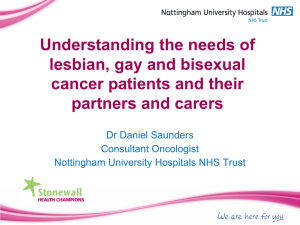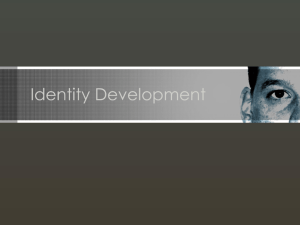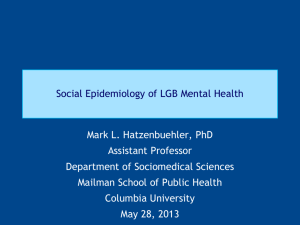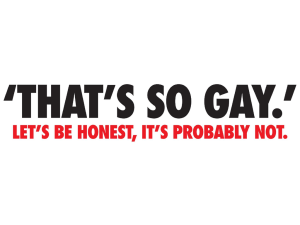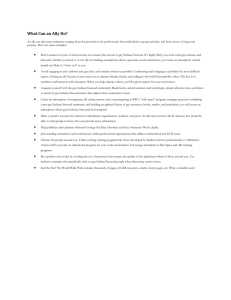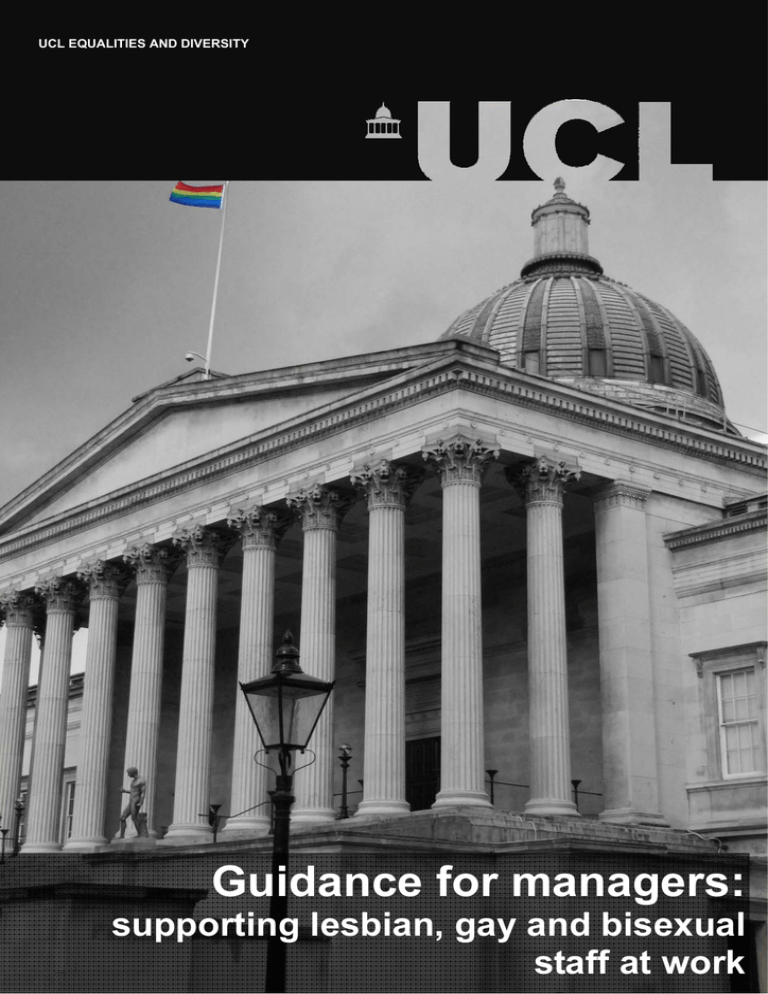
UCL EQUALITIES AND DIVERSITY
Guidance for managers:
supporting lesbian, gay and bisexual
staff at work
2
Guidance for managers: supporting lesbian, gay and bisexual staff at work
Why do UCL managers need specialist guidance?
Sexual orientation can be a complex area, especially for managers who are not
lesbian, gay or bisexual (LGB) themselves, do not know any LGB people or who
have little experience of managing diverse teams. This guidance is intended to
equip managers with the understanding and expertise they need to meet the needs
of LGB people and create an inclusive, high-performing team.
What is the definition of lesbian, gay and bisexual (LGB)?
Sexual orientation is an enduring sexual, emotional and/or romantic
attraction towards others. Heterosexuals are attracted to members of the
opposite sex while homosexuals are attracted to members of their own sex.
Lesbian - describes women who are attracted to women
Gay - describes men who are attracted to men
Bisexual - describes people attracted to both men and women
Some people are sexually attracted to their own sex but don't identify as
LGB. Stonewall estimates that 5-7% of the population in the UK is lesbian,
gay or bisexual.
Being out at work
“People perform better when
they can be themselves.”
- Stonewall
Many UCL staff may regard a colleague’s or their own sexual orientation as a
private matter. However whether a staff member is ‘out’ at work or not (open about
their sexual orientation) can impact on their performance. Research by Stonewall
has demonstrated that staff who are out at work are overwhelmingly more content at
work and consider that their performance improves too. Moreover, UCL’s 2009 staff
survey showed that staff who were out at work were generally more satisfied in the
workplace.
LGB people who are not out are unlikely to complain about harassment at work for
fear that if they do, their sexual orientation will become widely known. They may
need to behave differently at home and at work and to live in public or at work with a
social appearance which is inconsistent with their own feelings, or self image. They
may therefore experience loneliness, isolation and invisibility because their true self
is not known to colleagues.
3
Guidance for managers: supporting lesbian, gay and bisexual staff at work
LGB members of staff are vulnerable to being ‘outed’ against their will by students
or colleagues, perhaps inadvertently. This may have consequences where some
staff or students are strongly opposed to homosexuality or bisexuality.
LGB staff should be in control about who they are out to and when. Some staff may
be comfortable for some colleagues to know and not others – partially out - so it is
not appropriate to assume that others know about a colleague’s sexual orientation.
Deliberately outing a colleague or student is considered harassment under UCL’s
anti-harassment policies and, if proven, will be considered a disciplinary matter.
Harassment of lesbian, gay and bisexual people at work
LGB people, and those perceived to be LGB, sometimes experience homophobia,
hostility, harassment or prejudice at work which can go unrecognised and
unchallenged.
One of the most common manifestation of this is ‘jokes’ and banter in the workplace,
which managers need to ‘nip in the bud’ where it promotes negative stereotypes of
LGB people or uses offensive language e.g. the word ‘gay’ in a pejorative sense.
There is a growing body of employment case law dealing with this issue:
Whitfield vs. Cleanaway – a manager was taunted about his sexual
orientation by senior colleagues. Mr Whitfield, who never made reference to his sexuality at work, was nicknamed ‘Sebastian’ after the Little
Britain character. He was also called ‘dear’ after he ordered a ‘feminine’
drink at a business conference, as well as ‘abnormal’, a ‘queer’, a
‘queen’ and someone who liked ‘poofy drinks and handbags’. He was
awarded £35,000 in compensation.
Bielak vs. Next - Ms Bielak, a lesbian shop assistant, suffered months
of harassment by colleague Katrina Davies - a Jehovah’s Witness who played the Morrissey song ‘All the lazy dykes’ each time she entered the stockroom. Davies and her husband, also an employee at the
store, openly questioned whether Bielak and her partner were fit to
raise their seven-year old son. After an incident where she was shoved
and sworn at by Davies, Bielak lodged a complaint and went on sick
leave. Next failed to deal with the complaint for 14 months leading to
Bielak's resignation.
Banter can be fun, team-building, reduce stress and raise morale. However,
managers or colleagues should intervene if they think someone is feeling
uncomfortable and try to stop only the offensive banter. It is important to differentiate
between harmful and harmless banter, and if in doubt seek the views of lesbian, gay
and bisexual staff or outside advice from the Equalities and Diversity Team.
Managers who do not take firm action to curtail inappropriate banter and jokes could
be viewed as complicit in the harassment and risk low team morale, reduced
productivity and complaints from staff.
4
Guidance for managers: supporting lesbian, gay and bisexual staff at work
The experience of being lesbian, gay or bisexual
LGB people can face particular issues in the wider society, where they are seen by
many as deviating from the norm. For example:
♦
They may experience pressure to conform with the
‘norm’ and have to acquire coping strategies to
confront bias and hostility. Knowing that being out
can make them more vulnerable to prejudice, and
deciding who to trust can be stressful;
♦
Where an LGB person is not out, they may be
concerned about work events and social gatherings
where there is an expectation of being accompanied
by a partner;
♦
According to research by Stonewall, some lesbians
and bisexual women consider that being a woman is a bigger barrier at work
than being gay, and so will be wary about being out at work to avoid double
discrimination;
♦
There is a conflict for some people between their faith and sexual orientation.
A number of religions are hostile to homosexuality, which can alienate LGB
people of faith;
♦
LGB staff may be seen by colleagues as role models for LGB students and
thus it may be assumed that they will undertake all the pastoral care of LGB
students, which may be burdensome. There may also be assumptions that an
out LGB staff member will take responsibility for LGB issues in the workplace;
♦
Bisexuals may face a struggle for acceptance with either lesbians or gay men,
as well as with heterosexual colleagues;
♦
Black and minority ethnic LGB staff sometimes feel they have to choose
whether to identify with their ethnicity or sexual orientation, rather than both.
They may face racism from other LGB people or homophobia from people
from the same cultural or ethnic background.
Equal status of same-sex partners
UCL’s policies and benefits package are inclusive of same-sex partners, and
managers should advertise this to staff where appropriate. In particular:
♦
Same-sex partners are considered in the same way as opposite-sex partners
♦
LGB staff with dependents have the same rights under UCL employment
policies as other staff and students
♦
UCL’s pension schemes have the discretion of paying a pension to same sex
partners if there is a proven financial interdependence.
5
Guidance for managers: supporting lesbian, gay and bisexual staff at work
Top tips for supportive managers
♦
♦
Do not assume that everyone is heterosexual
♦
Take prompt action against homophobic banter, even if you
are not aware that you have any LGB staff
♦
Make LGB staff aware of UCL’s policies, benefits and LGBT
network ‘Out@UCL’;
♦
Make sure that social invitations use inclusive language e.g.
use the word ‘partner’ as a catch-all term for husband/wife/
civil partner/girlfriend/boyfriend
Encourage all staff to learn more about LGBT issues by
organising training or attending e.g. LGBT History Month events
Useful information:
UCL
For further advice contact the Equalities and Diversity Team
http://www.ucl.ac.uk/hr/equalities/contacts/index.php
UCL LGBT pages
http://www.ucl.ac.uk/hr/equalities/lgbt/index.php
LGB
Advancing LGB equality in Higher Education – Equality Challenge Unit 2010
http://www.ecu.ac.uk/publications/advancing-lgb-equality
Stonewall
http://www.stonewall.org.uk/
Pictured: Max Hill, Chair of UCL’s LGBT
Equality Group and Out@UCL
Equalities and Diversity
University College London
Gower Street
WC1E 6BT
www.ucl.ac.uk/hr/equalities

